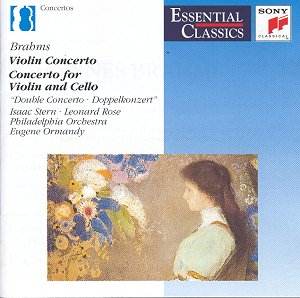Johannes BRAHMS (1833-1897)
Violin Concerto
Double Concerto
 Isaac Stern (violin)
Isaac Stern (violin)
Leonard Rose (cello)
Philadelphia Orchestra/Eugene Ormandy
ADD rec 1973/74
 SONY SBK 46335
[74.03]
SONY SBK 46335
[74.03]
Crotchet
£5.99
AmazonUK
£6.99
AmazonUS

Having been brought up, so to speak, on a CBS bargain box of the four Brahms
Concertos the experience of reviewing this CD has been a nostalgic voyage.
At the time (early 1970s) that box of LPs seemed and was matchless value.
It offered these two works (same performances) as well as Serkin/Szell in
the two piano concertos. I seem to recall that the set managed to squeeze
all four works onto three LPs by use of long sides and breaking works across
discs.
Ormandy and the Philadelphia are untamed partners in Brahms' musical alembic.
The orchestra's silver and golden flames, their passion and resinous fire
bears all before it. The sound is reassuringly flawed in the way of CBS
recordings from the late 1950s onwards into the mid 1970s: that peculiar
combination of closeness of focus and a graininess denying ultimate refinement
to the massed strings. This however has an amplitude and tonal generosity
superior to the Szell Brahms set also on Essential Classics.
Taking the Double Concerto first, Leonard Rose endows the work with eloquence
and a surfeit of the most glorious tone. One of the finest cellists in America
you cannot doubt his fiery application, his lyric 'stickiness' and smoky
passion all intensified by the close-miked recording. Rather like Yo Yo Ma's
pizzicati in the finale of the Finzi Cello Concerto (a Lyrita LP from 1979)
Rose's pizzicati are imperiously loud. It matters nothing that you would
never hear the music like this in a concert hall. Each melodic 'collision'
with Stern is assuredly calculated in its ecstatic chordal effect. The music
is always phrased with a warmth too hot to rest your hand on. Stern is brilliant
and his unanimity with Rose is, without doubt, down to their trio work with
Eugene Istomin for which the foundations were laid in Casals' Prades Festivals.
In the Violin Concerto Stern draws on powerful tone, a vibrant warmth and
a fully developed life-vision. Though I still wonder why Philips have not
reissued Hermann Krebbers' recording, which had some celebrity during the
days of LP, the listener who comes to Brahms through these performance is
likely to be spoilt when they go to concerts or encounter alternative versions.
A towering bargain. Fortunate the new listener who learns her/his Brahms
through these works.
Rob Barnett

